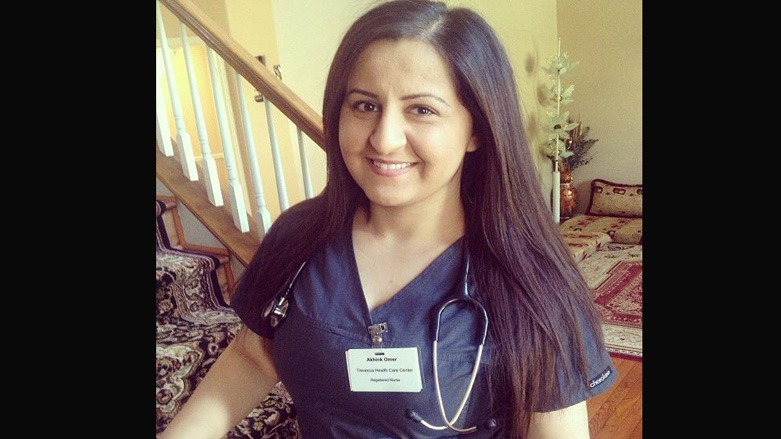Kurdish-American nurse who caught coronavirus warns public to stay home

ERBIL (Kurdistan 24) - Akhink Omer, a 31-year-old Kurdish-American nurse practitioner, initially thought she had a normal infection when she started showing symptoms of ill health. Several days later, though, she tested positive for coronavirus and has since urged the general public on social media to save the lives of others by staying home.
Despite the risks, many Americans are still frequenting bars and restaurants in cities where it is not restricted against the recommendations of health officials, reported The Atlantic on Tuesday.
“I am a healthy young person and COVID-19 has made me very sick,” she told Kurdistan 24 in an interview. “Before you decide to not stay home, ask yourself if it’s worth your grandma or grandpa’s life. Are you okay with risking the life of your elderly neighbor? We have a moral responsibility to look out for vulnerable populations.”
According to the World Health Organization (WHO), which declared it a global pandemic last week, the coronavirus has so far infected nearly 245,000 worldwide and killed over 10,000 since first appearing in China in late 2019.
Omer lives in Nashville, Tennessee, where she is on the faculty of Belmont University’s School of Nursing. Nashville is known for its sizeable Kurdish population and has even earned the unofficial nickname “Little Kurdistan.”
On Monday, March 9, she said she began to develop the first symptoms.
“The day before, on the eighth, I was completely fine. I even went to the gym and wasn’t short of breath.”
“From the very beginning, I did not think I had COVID-19. I thought maybe I had picked up some sort of bacterial infection, so I figured a couple days of antibiotics would make me feel better.”
However, it was difficult for her to receive a test, even as a health care professional. According to a recent report of the New York Times, as well as many others in the US media, many who fear they have the virus have faced one roadblock after another as they try to get tested, often without success.
“I first tried to get a test on March 12. I had already been sick four days at that point,” she continued. “I was unable to receive one until March 16, when I presented to the Emergency Department. By that day, the new criteria included healthcare workers who were exhibiting symptoms, so I was able to be tested.”
Her family and friends wanted her to be tested as well, “But it just wasn’t available. I isolated myself from my family while I was at home to make sure I didn’t spread anything to them.”
Although symptoms can vary for each individual, hers soon became severe.
“I had a pounding headache, fever and chills, body aches, a dry cough that would not stop. I would get extremely exhausted just walking from my room to the bathroom.”
One of her cautionary Twitter posts urges readers, “If you take anything away from this thread it’s stay home and don’t unnecessarily expose others. Throughout this whole process the thing I kept repeating is 'I don’t know how an elderly person would handle this.' Because when it’s bad it’s really bad.”
As a nurse, she said she feels that the United States has failed tremendously in the testing of its citizens.
“To this day, open testing is not available to all Americans, despite what the Trump Administration says. It is causing uncertainty and panic. The US health care system will not be able to handle a massive outbreak of COVID-19, so the availability of testing is a matter of life and death.”
Another of her posts reads, “My middle eastern parents who think #America is the greatest place on Earth and can solve any problem are having the hardest time understanding why I can’t get a #Coronavirus test even with symptoms.”
Therefore, she said supported the decision of the Kurdistan Regional Government (KRG) to impose strict curfews to contain the spread of the virus, as well as multiple other precautionary measures.
Read More: KRG extends curfew another 5 days, now across entire Kurdistan Region
“The best thing that can be done is to get ahead of this virus and stop its spread early on. Kurdistan’s health care system cannot handle a mass outbreak so quarantining citizens is crucial. We must sacrifice a little now so that thousands don’t die,” she concluded.
Editing by John J. Catherine
